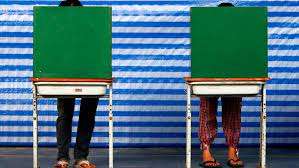The Ballot Box Beckons
Let the people decide who will steer the ship of state for the next five years. Political maneuvering, a time-worn tactic in Pakistan’s playbook, has only exacerbated the country’s multiple crises.
This time, let the ballot box, not backroom deals, determine the nation’s fate. Emerges from the fog of uncertainty and enters the heat of electioneering, one thing is clear: the stakes have never been higher.
From Uncertainty to Electioneering
The people yearn for stability, for leadership that can navigate the treacherous waters of economic hardship, social unrest, and regional turmoil.
It is now up to the parties, through their manifestos and their conduct, to bring them to the ballot box by convincing the electorate, that they possess the strength and the vision to usher in a new dawn for Pakistan. The voters, armed with critical thinking and a yearning for a better tomorrow, will be the final arbiters. Let the campaign begin.
A thick fog of uncertainty enveloped the country’s political landscape just weeks ago. Would the general elections, scheduled for February 8th, actually take place? The question hung heavy in the air, fueled by political maneuvering and legal wrangling. Now, however, the clouds have parted, revealing a sunlit path towards the ballot box.
Mainstream Heavyweights Enter the Fray
Nominations for federal and provincial legislatures closed on Sunday evening, with heavyweights from across the political spectrum throwing their hats into the ring. Mainstream parties, their big guns leading the charge, are front and center. Nawaz Sharif, the PML-N supremo, is back in the fray after years of legal exile.
Asif Zardari, the seasoned PPP leader, seeks to extend his party’s political legacy. Imran Khan, the charismatic PTI chief, despite claiming hurdles in his path, has filed his nomination papers.
Maulana Fazlur Rehman, the JUI stalwart, seeks to translate his religio-political appeal into electoral success. And let’s not forget Bilawal Bhutto-Zardari, the young scion of the Bhutto dynasty, who shoulders the mantle of his family’s political heritage.
The Electoral Canvas
But Pakistan’s electoral canvas is rarely painted in solely mainstream hues. The migratory tribe of ‘electable’, those adept at navigating the shifting sands of political alliances, adds intrigue to the contest. Their loyalties, ever fluid, will be courted and traded as parties seek to bolster their electoral prospects.
Promises vs. Progress
Conversely, the mere spectacle of nominations shouldn’t distract from the true purpose of this exercise: to offer voters a choice, a roadmap for Pakistan’s future. Elections are not popularity contests, as the Supreme Court has rightly pointed out.
They are a solemn pact between the people and their elected representatives, a promise to tackle the myriad problems that plague Pakistan’s social and economic fabric.
The Need for Manifestos and a Shift from Popularity Contests to Policy Pacts
In this regard, a worrying silence hangs over the manifestos. Except for Jamaat-i-Islami, none of the major parties have unveiled their vision for Pakistan’s uplift. Were they, perhaps, lulled into a false sense of uncertainty, their policy pronouncements gathering dust as the election date danced in the realm of speculation?
The Supreme Court has spoken, declaring its unwavering commitment to holding the polls on schedule. Parties must now shift gears, abandoning the comfort of speculation and embracing the urgency of action. Their manifestos, not vague promises or populist slogans, must become the battleground of ideas.
It is true that Pakistan’s political culture, steeped in clan loyalties and ethnic affiliations, often renders party manifestos mere afterthoughts. Many voters, swayed by family ties or tribal allegiances, may pay little heed to policy specifics.
Beyond Clan Loyalities and Slogans
Yet, a growing segment of the electorate, particularly the tech-savvy youth, craves substance over spectacle. They demand solutions, not soundbites. They seek answers to their anxieties about a struggling economy, inadequate healthcare, crumbling education systems, and rampant crime.
Manifestos for the Masses
Consequently, manifestos must transcend the echo chambers of party offices and resonate with the lived realities of people in dusty villages and sprawling cities alike. Parties have a moral obligation to articulate their plans for fixing the economy, revitalizing healthcare, reforming education, and ensuring public safety and to value the ballot box.
Hollow promises will no longer suffice; concrete policies, meticulously crafted and lucidly communicated, are the new currency of electoral success. But even the most eloquent manifesto cannot legitimize an electoral process marred by exclusion. The state’s attempts to sideline the PTI, through legal challenges and administrative hurdles, must cease.
A Level Playing Field is Key
A level playing field is the bedrock of any credible democracy, and Pakistan’s fragile political system cannot afford the tremors of an uneven contest.


